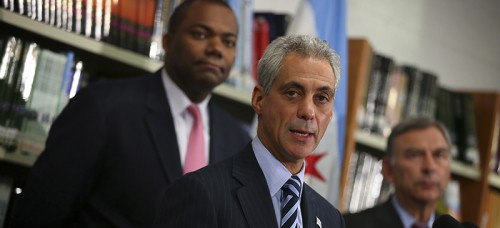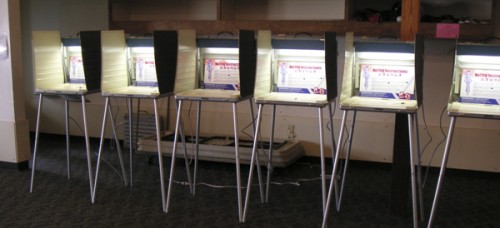
Although Chicago will not know who its future mayor will be until April’s runoff election, voters were unambiguous in their approval for multiple referendum issues.
Among the issues placed on referendum for most voters was an initiative for an elected school board, mandatory paid sick leave for workers, mandatory counseling for city employees convicted of domestic abuse, and public campaign funding for small time city political candidates. A few additional proposals were on the ballot for residents of certain Chicago wards.
These referenda were non-binding advisory referenda, meaning that a “yes” decision does not carry official force of law. However, the overwhelmingly affirmative response on each of these issues should send a strong message to policymakers who wish to acurately represent their constituents.
Although academic and professional opinion on sick leave and domestic abuse issues remain largely harmonious, there exists strong contention over certain referendum proposals, especially for elected school boards.
Chicago is currently one of the few major urban areas with an appointed school board, and the largest city in the United States to have all its school board members appointed by a single person: the mayor.
The city’s appointee system came to be in the 1990s, partially as a response to the criticism former mayor Richard M. Daley received for the state of Chicago Public Schools during his regime.
“Daley argued that he was being held responsible for the performance of the school board that he had little control of,” William Sampson, a DePaul public policy professor and former educational administrator, said. In turn, the appointee system was implemented.
The role of a school board can vary, but its importance generally extends beyond the classroom.
“School boards are generally responsible for fiscal and organizational facilitation of an educational system, as well as delegating certain decision of principals. Principals delegate what actually goes on in the classroom, such as approving exact class choices,” Barbara Radner, director of DePaul’s Center for Urban Education, said. “For instance, (Chicago’s school board) under (former board President) Gary Chico worked to generally emphasize non-fiction reading, as well as get outside funds for such initiatives.”

Many critics of appointee school systems say that there is too little public oversight present within such a system. An elected school board official would theoretically remain more accountable to the constituents who elected him or her.
“Now, the advantage of (an elected system) is that its less susceptible to politics in some ways. This current mayor — or even most mayors — think about policy in the mindset of ‘how is this going to affect me politically,’” Sampson said. “When appointed, (members) are responsive to one person only: the person who appointed them.”
However, an elected board would function far from a magic bullet in solving school mismanagement, as elected systems face pitfalls of their own.
“The criticism of an elected board is typically that they don’t know enough about finance or educational administration to effectively run a school system. That leaves them vulnerable to manipulation by staff who actually know schools,” Sampson said. “I was on an elected school board (in Evanston) … and I could see how people — the superintendent in particular — would manipulate board members who didn’t have knowledge or experience, and he could use that to get what he wanted.”
Conversely though, it hasn’t been shown that government takeover of elected boards necessarily has much positive effect either. For example, the School District of Philadelphia underwent a state takeover beginning in 1998. A 2014 policy brief from Pacer Research showed that neither financial solvency nor student test scores showed much change — either positive or negative — as a result of an appointed system. Fluctuations in Philadelphia’s test scores through these years were largely attributed to likely academic fraud — another phenomenon that has been found in both types of school board systems.
A similar study conducted by Rutgers University also found no statistically conclusive correlation between mayoral school board control and test scores.
Although Chicago’s voters showed extreme support for the notion of an elected school board, evidence from elsewhere showed that the ramifications of such a policy are less clear-cut than expected. Illinois lawmakers will need to consider such ramifications before deciding whether to adapt such proposals into written law.
“Any successful system will ultimately need a balance of people versed in finance, pedagogy and labor management, all of whom ideally must care about childrens’ interests, ” Radner said. “Elected and appointed systems can each succeed or fail based upon the care of selection (of its members).”


Carlos Trigleth / Mar 2, 2015 at 10:22 pm
The article on the a elected Chicago School Board was wrong we haven’t had a elected school board in my lifetime and I 59 some go back on your research. This whole thing was about race, check into the action of the first Mayor Daley. Read a little Mike Royka I sure you the information unless you hunting for a job. With the above mention organization
The uncle of 3 Depual graduates
Thanks.